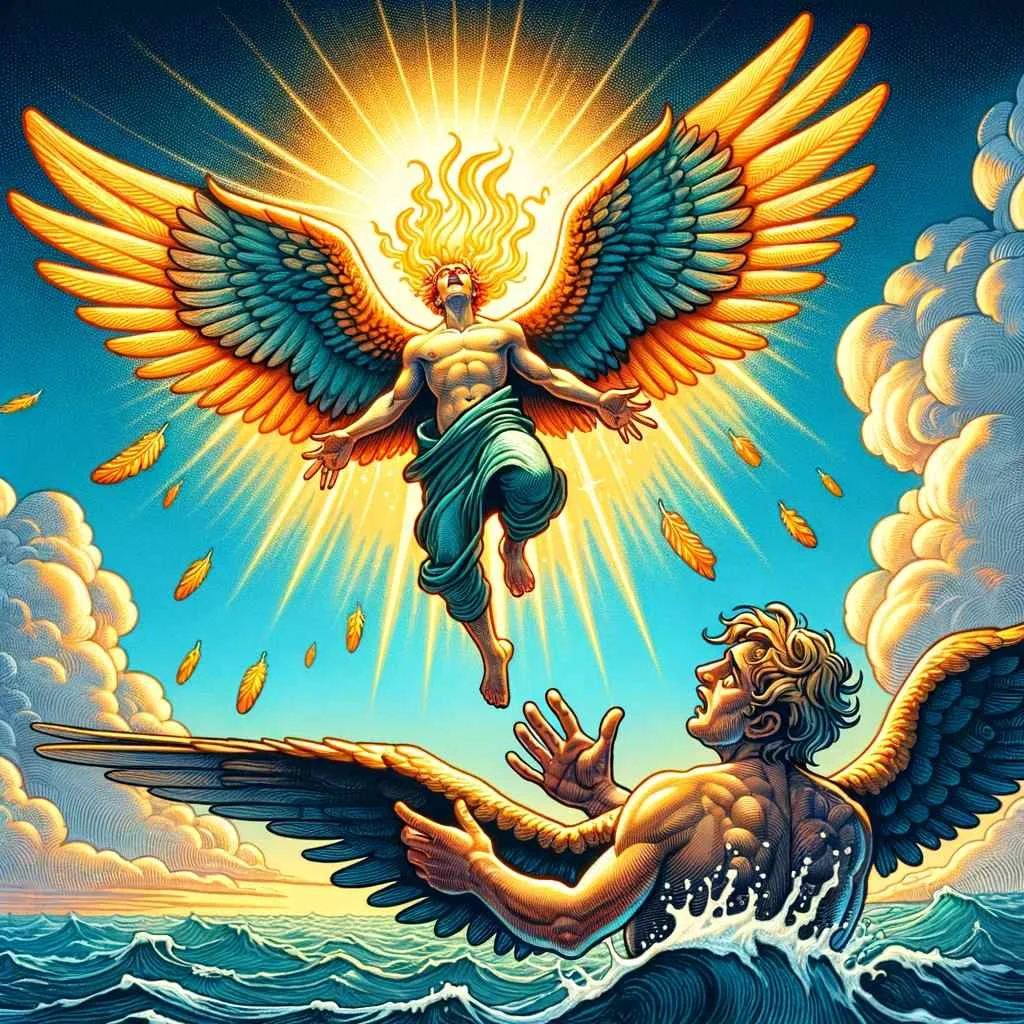In the ancient world, where gods mingled with mortals and heroes rose from the simplest of beginnings, there lived a master craftsman named Daedalus.
Renowned throughout the lands for his skill, Daedalus found himself in Crete, serving King Minos. It was here, in a labyrinth of his own design, meant to imprison the monstrous Minotaur, that Daedalus’ story intertwines with that of his son, Icarus.
One day, in their sun-drenched workshop, Daedalus turned to Icarus, his eyes alight with a plan of escape.
“My son,” he began, his voice steady and sure, “the time has come for us to leave this island. Minos controls the land and the sea, but he does not command the skies. That is where we shall find our freedom.”
Icarus watched, wide-eyed and eager, as his father set to work, gathering feathers of all sizes, binding them together with twine, and shaping two pairs of wings. Daedalus worked with the precision and care that had made him famous, his hands moving in a dance of creation.
Finally, the wings were complete. Daedalus fitted the smaller pair onto Icarus, his hands gentle but firm. “Listen carefully, my son,” he said, his voice tinged with a seriousness that made Icarus straighten his back.
“These wings will carry you across the sky, but you must heed my warning. Do not fly too low, for the dampness of the sea will weigh down your wings. And do not fly too high, for the sun’s heat will melt the wax that holds them together. Keep to the middle path.”
Icarus nodded, his young face set in a determined expression. “I understand, Father. I will follow your path and not stray.”
With a deep breath, Daedalus donned his own wings, and together, they took to the skies. The sensation was exhilarating; Icarus felt the wind rush past him, the freedom of the air intoxicating. Below them, the world seemed a distant dream, and ahead, only the endless embrace of the sky.
But as they flew, Icarus’ heart swelled with the joy of flight, and he began to climb higher, drawn to the warmth of the sun. “Icarus!” Daedalus called out, his voice laced with fear. “Remember my warning!”
Yet, the warning fell on deaf ears. Icarus, caught in the rapture of his ascent, soared higher, feeling invincible. It was not long before the heat of the sun began to soften the wax of his wings, and the feathers started to loosen and fall away.
“Icarus!” Daedalus cried again, despair coloring his tone as he watched his son’s ascent turn into a calamitous fall. Icarus flailed, trying to catch the feathers slipping from his grasp, his voice calling out to his father in terror.
But it was too late. Icarus plunged into the sea, the waves closing over him with a finality that echoed in the silent skies. Daedalus, heartbroken, circled down to the water’s surface, his cries of grief lost amidst the roar of the waves.
The story of Icarus and Daedalus serves as a timeless warning, a tale of hubris and the dangers of overreaching ambition. Daedalus, the master craftsman, survived, but the loss of his son haunted him for all his days, a reminder of the price of flying too close to the sun.
Also Read: Kind Midas and The Golden Touch
Moral Of The Icarus Story
The story of Icarus and Daedalus warns against the dangers of hubris1, as Icarus ignores his father’s advice and flies too close to the sun, leading to his downfall. It emphasizes the importance of heeding wise counsel, showcasing the tragic consequences of disregarding experienced guidance.
The tale illustrates the perils of overreaching ambition, where Icarus’s desire to soar higher results in his fatal plunge into the sea.
It advocates for moderation and the middle path, highlighting the wisdom of balancing ambition with caution.
Ultimately, the story serves as a reminder that actions have consequences, often irreversible, underscoring the need for thoughtful consideration before acting.
- Hubris is a concept originating from ancient Greece, where it denotes excessive pride or self-confidence, especially in a way that defies the gods or social norms, leading to one’s downfall. In Greek tragedies, hubris is often the fatal flaw that brings about the tragic hero’s demise. It represents arrogance and overestimation of one’s capabilities or position, to the point of challenging divine or natural laws. This defiance is typically followed by nemesis, the retribution that brings about the character’s downfall. In modern usage, hubris still refers to extreme pride or arrogance, but the emphasis is on the overconfidence and disregard for limitations that can lead to one’s failure or destruction, even outside of a religious or mythological context. ↩︎

